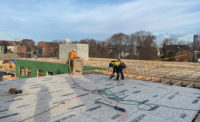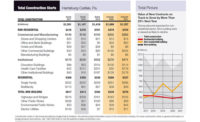Amazon’s $2-billion Housing Equity Fund is revving up to help preserve and develop 20,000 affordable housing units by the end of 2025. The Seattle-based online retail giant and cloud services provider is targeting three locales—Washington state’s Puget Sound region; the nation’s capital region, where Amazon is investing $2.5 billion over the next decade on its HQ2 project in Arlington, Va.; and Nashville, where Amazon has finished a 20-story high-rise and is building a 22-story tower at Nashville Yards.
The Housing Equity Fund, announced in January, is Amazon’s response to the nation’s affordable housing crisis. It provides grants and below-market-rate loans to housing partners, traditional and nontraditional public agencies and minority-led groups.
“We are leveraging Amazon’s balance sheet to do good in the affordable housing arena,” says Catherine Buell, Amazon’s head of community development.
Amazon is not the only tech giant addressing the shortage of affordable housing. In November 2019, Apple committed $2.5 billion to combat the housing crisis in California. Microsoft, Google and Facebook also have programs.
Amazon is focusing on transit-oriented housing through as much as $300 million in loans to developers for an estimated 3,000 new units on land owned by transit agencies or on private land in close proximity to public transit. Specifically, the fund has announced the availability of $125 million in loans to developers working with the Washington Metropolitan Area Transit Authority for more than 1,000 living units in the capital region; $100 million to developers working with Sound Transit for up to 1,200 units in Washington state’s Puget Sound region; and $75 million to developers for an estimated 800 units on private land in Nashville, near WeGo transit corridors.
“We invite developers to submit proposals” for affordable housing projects that would otherwise not go forward without Amazon capital, Buell says. “We are looking for innovative projects that can move at scale,” she adds.
Amazon project announcements are coming by the end of the year. “We are hoping this [fund] will draw in other investors” as well, Buell says.
Though new construction will soon fill the pipeline, the fund’s initial focus is on preserving existing affordable rents. In January, Amazon announced it provided $381.9 million in loans and grants to the Washington Housing Conservancy—a nonprofit working in and around the nation’s capital. WHC used the funds to buy the Crystal House apartments in Arlington, Va., less than a block away from Amazon’s HQ2 project, currently under construction. In July, through WHC, Amazon donated $40 million for the purchase of a parcel adjacent to Crystal House, which it then donated to Arlington County to develop more than 550 affordable units.
“We used Amazon’s money to create something extra,” says Kimberly Driggins, WHC’s executive director. “They think big—nothing seems to be a barrier.”






Post a comment to this article
Report Abusive Comment